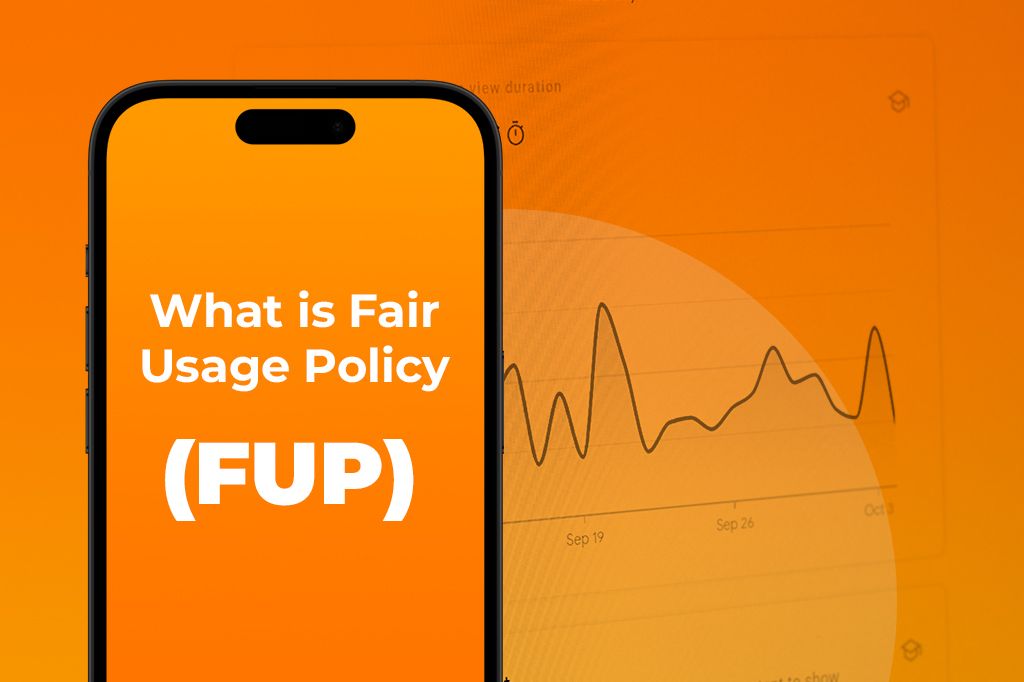Геймър в селска Индия се абонира за „неограничен“ интернет, само за да открие, че скоростите рязко спадат след 20GB. Какво се е случило? Политика за справедливо ползване. Въпреки името си, тя не се отнася до справедливостта. Това е начинът, по който интернет доставчиците управляват споделените мрежи. Също така не е и твърд лимит; няма да ви спрат достъпа или да ви таксуват допълнително. Но ще забележите по-ниски скорости, ако често стриймвате, играете игри или изтегляте големи файлове.
В тази статия ще разгледаме какво всъщност представлява Политиката за справедливо ползване, как работи и защо не трябва да приемате „неограничен“ за чиста монета.

Снимка от Джъстин Морган в Unsplash
Какво е Политика за справедливо ползване?
Политиката за справедливо ползване (FUP) е набор от технически правила, използвани от доставчиците на интернет услуги за управление на мрежовите ресурси и гарантиране на справедлив достъп за всички потребители. Тя следи потреблението на данни и ако потребител надхвърли определени прагове, може да задейства действия като ограничаване на скоростта или оформяне на трафика. За разлика от фиксираните лимити на данни, FUP се адаптира динамично, за да предотврати претоварването на мрежата и да поддържа общото качество на услугата.
И така, какво всъщност означава „справедливо ползване“? Нека го разгледаме по-подробно:
-
„Справедливо“ означава да се гарантира, че никой не използва толкова много данни, че да навреди на изживяването на другите. Интернет доставчиците се опитват да намерят баланс между това да позволят на хората да използват това, от което се нуждаят, и да поддържат мрежата бърза за всички.
-
„Ползване“ се отнася до това колко данни използвате за дейности като стрийминг, изтегляне или игри. Става въпрос за управление на честотната лента, която е ограничен ресурс.
-
„Политика“ означава, че има въведени правила, за да се поддържа услугата под контрол. Тези правила може да са записани в договора ви и доставчиците могат да ги прилагат, като намаляват скоростта ви, временно ограничават достъпа ви или дават приоритет на по-леките потребители.
Накратко, FUP има за цел да поддържа интернет услугата справедлива и надеждна за всички, особено когато някои потребители консумират много повече данни от други.
Знаетехте ли? Политиката за справедливо ползване (FUP) възниква в ерата на dial-up връзките, когато тежките потребители можеха да забавят мрежата за останалите. С увеличаването на скоростта на интернет, от dial-up през широколентов до 5G, FUP стават по-структурирани и широко възприети.
Скритата икономика зад FUP
Интернет доставчиците не винаги казват цялата истина, но основната цел на FUP е да се предотврати претоварването на мрежите. Доставчиците знаят, че повечето хора няма да използват цялата честотна лента, за която са платили. Ето защо те продават повече капацитет, отколкото имат, като на практика залагат, че не всички ще натоварят максимално връзката си по едно и също време. Но когато малка група потребители започне да използва огромно количество данни, това може да забави всичко за всички. Така доставчиците задават вътрешни лимити въз основа на прогнози и тенденции в потреблението, за да решат тихо какво се счита за „твърде много“. Ако надхвърлите този праг, те може да забавят връзката ви или да намалят приоритета на трафика ви, особено когато мрежата е натоварена.
Освен това, изграждането и поддържането на тази инфраструктура е скъпо. За да избегнат твърде честото обновяване на мрежите си (което струва много), доставчиците отново разчитат на FUP. Нещо повече, бивши инженери и вътрешни лица казват, че тези прагове са създадени, за да балансират печалбите и удовлетвореността на клиентите. В повечето случаи малък брой потребители причиняват по-голямата част от натоварването. Като се насочват към тях, доставчиците могат да поддържат мнозинството доволно, докато отлагат скъпите подобрения на мрежата. Това е и причината да виждате „неограничени“ планове с дребен шрифт, защото зад кулисите скоростта ви не винаги е гарантирана.
Обяснение на видовете Политики за справедливо ползване (FUP)
| Тип FUP | Пример | Последствие в реалния свят | Обяснение |
|---|---|---|---|
| Ограничаване при мек лимит | 100GB лимит на „Неограничен план“ | Скоростта на интернет пада до 256kbps или по-ниска след превишаване на 100GB | Много доставчици рекламират „неограничени“ планове, но задават мек лимит на данните. След като го преминете, скоростите се забавят, за да се спре тежките потребители да заемат цялата честотна лента. Все още можете да използвате интернет, но много по-бавно. |
| Ограничаване според времето от деня | Оферти за „неограничен само през нощта“ | Намалени скорости през натоварените дневни часове; по-бавна връзка по време на пиковите часове | Някои планове ви позволяват да използвате неограничени данни само през нощта или извън пиковите часове. През натоварените часове скоростта ви се ограничава, за да се поддържа стабилността на мрежата. Това засяга потребители, които се нуждаят от бърз интернет през деня, като геймъри или работещи от разстояние. |
| FUP за конкретни приложения | Видео стриймингът е ограничен до стандартна дефиниция (SD) | Видео приложения като YouTube са ограничени до 480p при някои 4G планове | Доставчиците намаляват честотната лента за конкретни приложения с високо потребление, като видео стрийминг, за да спестят мрежови ресурси. Това означава, че видеата се зареждат с по-ниско качество, което влияе на зрителското изживяване, но помага за безпроблемната работа на мрежата. |
| Лимити според типа устройство | Wi-Fi тетърингът е блокиран или забавен в мобилните мрежи | Мобилните хотспотове или рутерите получават по-ниски скорости или са блокирани, докато телефоните остават бързи | Някои доставчици третират устройствата по различен начин. Те могат да ограничат или блокират тетъринга и рутерите, защото тези устройства често използват повече данни, което може да натовари мрежата повече от смартфоните. |
| FUP, специфичен за страната | Предплатена SIM карта в Япония се забавя след 3GB/ден | Пътуващите се сблъскват със спад на скоростта след дневните лимити на данни, което намалява свързаността в чужбина | В някои държави предплатените или роуминг SIM картите имат строги дневни или месечни лимити на данни. Когато те бъдат достигнати, скоростите се намаляват, за да се управлява капацитетът на местната мрежа, което може да разочарова туристите или краткосрочните потребители. |
Какво повечето хора разбират погрешно за „неограничения“ интернет
Много хора мислят, че „неограничен“ интернет означава без никакви лимити, но това обикновено не е вярно. Повечето „неограничени“ планове имат скрити правила, които могат да забавят връзката ви, след като използвате определено количество данни. Ето какво всеки трябва да знае, преди да се ангажира с неограничен план за данни:
-
Може да не получите предупреждение, преди скоростта ви да бъде намалена. Доставчиците просто намаляват скоростта ви, след като достигнете техния праг за данни, без да ви уведомят предварително.
-
Не само потребителите, които изтеглят много, биват ограничавани. Дори редовни потребители, извършващи основни задачи като Zoom разговори, игри или стрийминг, могат да бъдат засегнати, ако използват много данни.
-
Превишаването на лимита ви за данни не е нарушение на закона. Това е договорно правоотношение между вас и вашия доставчик. Те могат да намалят скоростта ви или да ви таксуват допълнително, но вие не извършвате престъпление.
-
Различните видове интернет имат различни лимити на данни. Оптичният и кабелният интернет обикновено предлагат по-високи лимити, докато безжичният и 5G често имат по-ниски прагове. Стриймингът на HD видео, игрите и видео разговорите изразходват много данни бързо.
Така че помнете, „неограничен“ обикновено означава, че има лимит на данни с висока скорост и след като го преминете, скоростта ви може да спадне. Знаейки това, ще избегнете изненади и ще управлявате данните си по-умно.
Колко ясни са вашите интернет доставчици относно лимитите на данни?
Оценихме големи интернет доставчици в САЩ, Великобритания, Индия, Австралия и ОАЕ, за да видим колко ясно комуникират своите Политики за справедливо ползване (FUP) с клиентите си.
-
Споменават ли ясно лимитите на данни в рекламите си, или просто казват „неограничен“, без да обясняват?
-
Ограничаването на скоростта (забавянето на интернета ви) предсказуемо и справедливо ли е, или е случайно и объркващо?
-
И правят ли изключения за важни нужди като медицински устройства или домашно обучение?
Това, което открихме, е, че като цяло много доставчици използват термина „неограничен“ в маркетинга, за да привлекат клиенти, но често не споделят открито действителните лимити на данни или ограниченията на скоростта, скрити зад тези твърдения.
-
Обединеното кралство: Поради силния регулаторен надзор от Ofcom и решенията на Advertising Standards Authority (ASA), много британски доставчици трябва ясно да разкриват лимитите на данни и праговете за ограничаване на скоростта. Например, от EE беше изискано да уточни, че скоростите могат да бъдат намалени след използване на 600GB данни за месец. Тази прозрачност е положителен модел, но не е напълно последователна сред всички британски доставчици.
-
Съединените щати: Прозрачността варира значително. Някои доставчици, като Verizon и AT&T, публикуват открито своите FUP условия, докато други заравят важни детайли в обемни договори или сложни политически документи. Води се постоянен дебат за мрежовата неутралност, но много клиенти все още не разбират напълно кога и как се случва ограничаването на скоростта.
-
Индия: Големи доставчици като Jio, Airtel и Vodafone имат огромни потребителски бази, но показват смесени нива на прозрачност. Нашето проучване потвърди предишни доклади, че тези доставчици често нямат ясна комуникация относно лимитите на данни и политиките за ограничаване, оставяйки клиентите объркани кога интернетът им може да се забави.
-
Австралия: Австралийските доставчици като Telstra и Optus са склонни да публикуват подробни политически документи онлайн, но маркетинговите материали все още твърдят „неограничен“, без да обясняват лимитите предварително. Как и кога ограничават скоростта може да се променя в зависимост от условията на мрежата, така че потребителите може да го намерят за непредсказуемо.
-
Обединени арабски емирства: Интернет пазарът в ОАЕ се разрасна бързо, но има малко регулации, които да изискват от доставчиците ясно да обясняват своите Политики за справедливо ползване. Доставчиците често споделят подробности за политиката онлайн, но рекламите им остават неясни, а практиките за ограничаване могат да изглеждат произволни за потребителите.
Ограничаването на скоростта може да бъде или директно, забавяйки скоростите след достигане на ясен лимит, или непредсказуемо в зависимост от натовареността на мрежата. Не е чудно, че това може да остави потребителите разочаровани. Повечето доставчици не гарантират официално специално третиране за критични нужди, като медицинско оборудване или онлайн обучение, което е сериозен проблем за тези, които зависят от стабилен интернет.
Като цяло, нашето проучване разкрива глобална мозайка от нива на прозрачност. Докато някои доставчици са откровени и ясни относно своите политики за данни, много оставят клиентите в неведение. Тази липса на яснота може да доведе до разочарование и несправедливо третиране. Насърчаваме по-добра прозрачност, за да могат потребителите да правят информиран избор и да се доверяват на своите интернет доставчици.
Дали FUP някога е наистина справедлива?
Политиките за справедливо ползване са предназначени да поддържат интернет справедлив и бърз за всички. Но справедливостта не се случва автоматично; от вас зависи да останете любопитни, да задавате трудни въпроси и да изисквате ясна и честна информация. Не приемайте неясни договори или скрити условия, настоявайте доставчиците и регулаторите да бъдат прозрачни и отговорни. Когато изразявате мнението си и сте информирани, вие поемате контрол над вашето интернет изживяване и помагате за изграждането на по-справедлив онлайн свят за всички.
Ако искате да видите това в действие, изпробвайте безплатен eSIM от Yoho Mobile и вижте как справедливото ползване може да работи във ваша полза.
Често задавани въпроси, които няма да намерите на сайтовете на доставчиците
Мога ли да се противопоставя, ако интернетът ми е забавен (ограничен)?
Да! Започнете, като се свържете с поддръжката на клиенти на вашия доставчик с доказателства, като тестове на скоростта, показващи бавни скорости. Проверете договора си за услуга, за да видите дали ограничаването на скоростта е разрешено. Ако не помогнат, можете да ескалирате жалбата в рамките на компанията или да я докладвате на регулатори като FCC. Понякога е възможно правно действие, но често смяната на доставчик или план е най-лесното решение. Използването на VPN може да помогне за заобикаляне на ограничаването, но не е гарантирано решение.
Ще спре ли смяната на DNS лимитите на данни или ограничаването на скоростта?
Не. Смяната на вашия DNS влияе само върху това как се намират уебсайтовете, а не върху това колко данни използвате. Доставчиците проследяват общото ви количество данни и ви забавят, ако надхвърлите лимита си, независимо какъв DNS използвате. За да избегнете лимитите, ще ви трябват инструменти като VPN, които скриват типовете трафик, а не само промени в DNS.
Прилага ли се Политиката за справедливо ползване (FUP) по време на прекъсвания или бедствия?
Обикновено не. По време на прекъсвания или извънредни ситуации доставчиците се фокусират върху поддържането на връзката ви и може да спрат лимитите на данни. След като всичко се върне към нормалното, обичайните правила отново се прилагат. Колко облекчават тези правила зависи от доставчика и местните закони.
Мога ли да съдя моя доставчик за несправедливо ограничаване на скоростта?
Може, но е сложно. Повечето договори изискват споровете първо да преминат през арбитраж или съд за малки искове. Преди да заведете дело, документирайте проблема си, опитайте с поддръжката на клиенти и подайте жалби до органи като FCC. Правното действие е крайна мярка и обикновено работи само ако вашият доставчик е нарушил договора или ви е подвел, тъй като ограничаването на скоростта често е законно, ако е ясно посочено във вашия план.
Ако използвам VPN, може ли моят доставчик все още да ограничава данните ми?
Да. VPN скрива какво правите онлайн, но вашият доставчик все още вижда колко данни използвате. Тъй като целият ви трафик преминава през тяхната мрежа, те все още могат да преброяват и ограничават потреблението ви. Всъщност VPN понякога добавя малко повече данни, така че не спира ограничаването на скоростта или лимитите на данни; просто скрива подробностите за вашата дейност.


